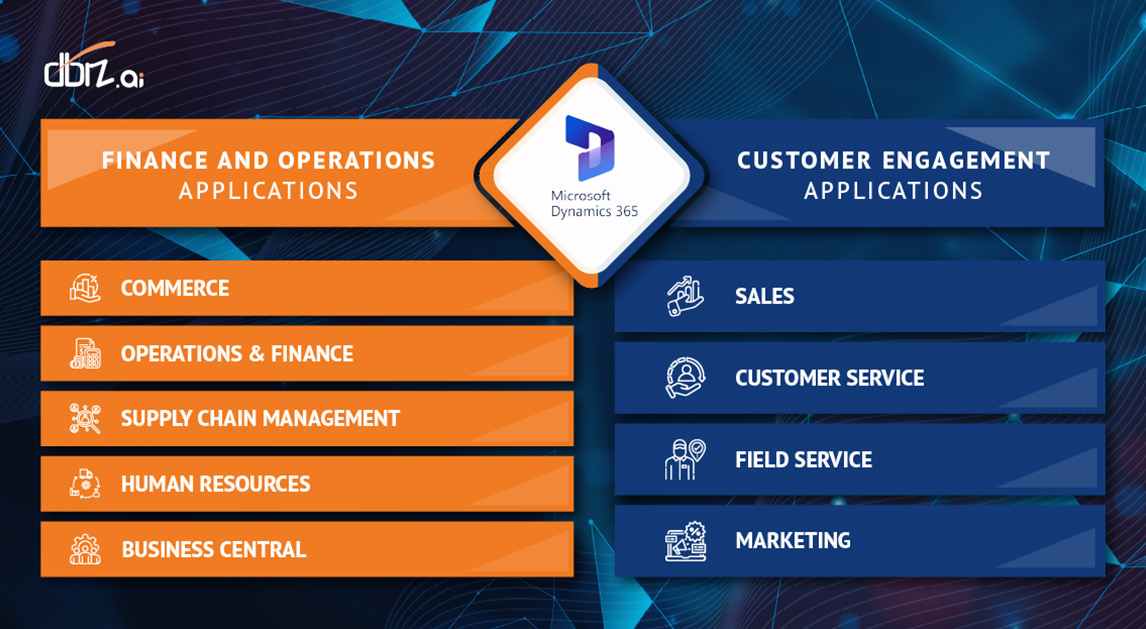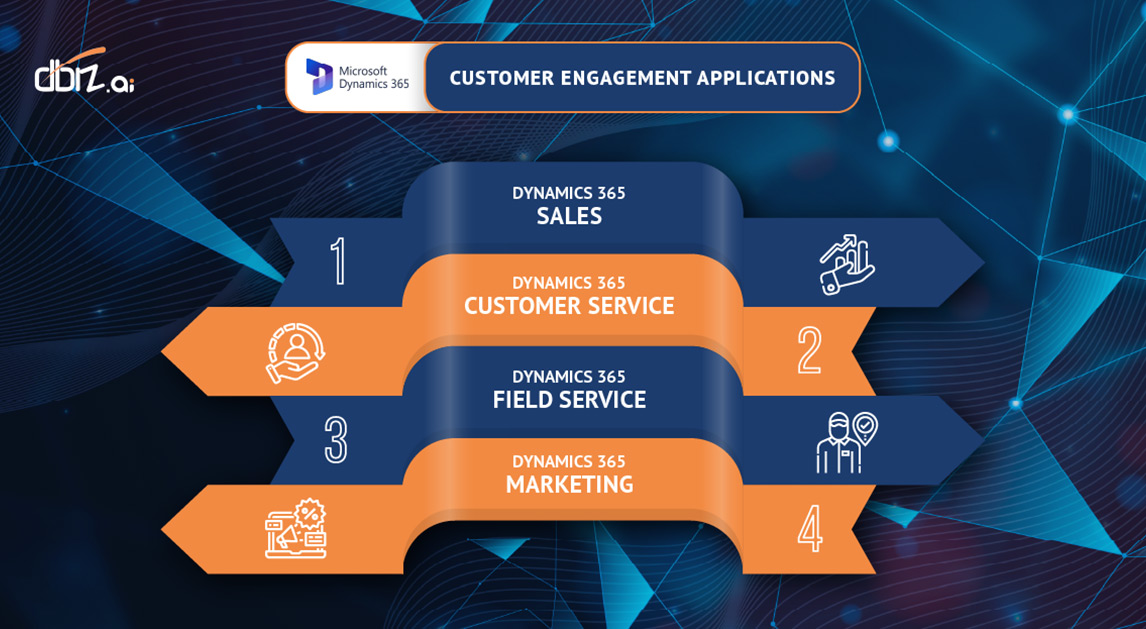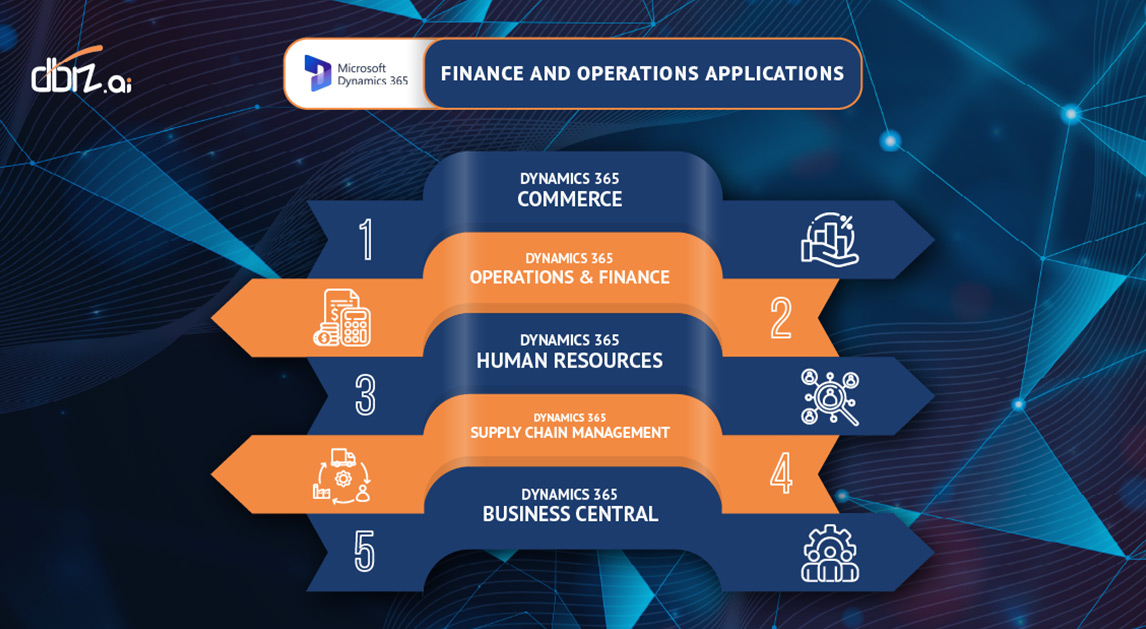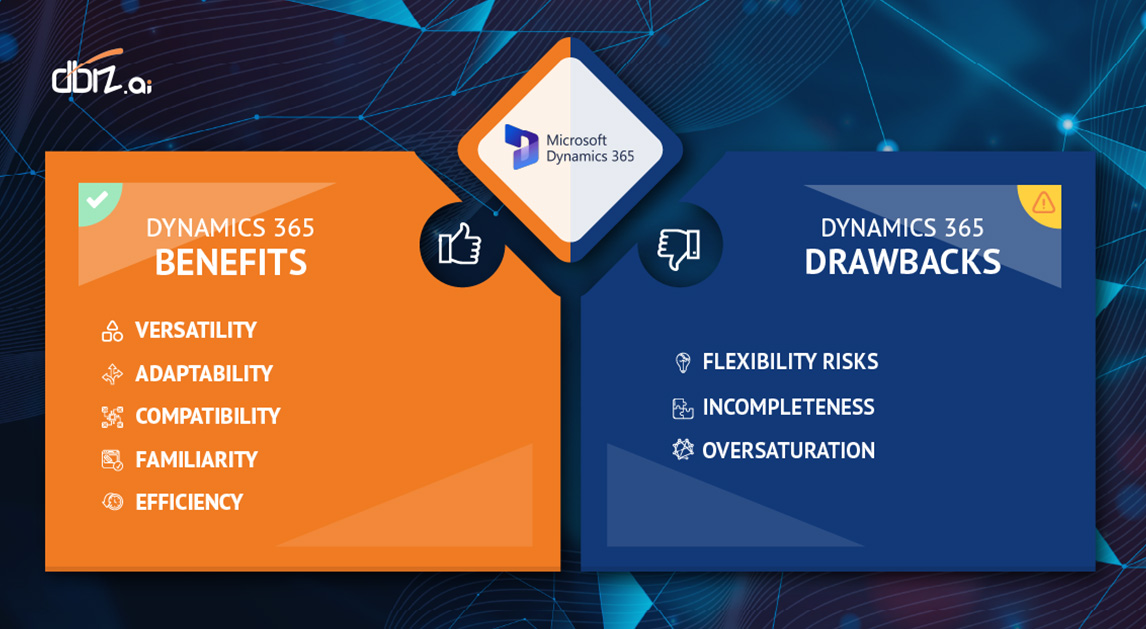Table of Contents
Microsoft Dynamics 365 is a comprehensive solution used by different types of businesses.
For enterprises that need to integrate complex data from different sources or departments, Microsoft Dynamics 365 offers a way to break down silos and align processes, with a unified customer relationship management (CRM) and Enterprise Resource Planning (ERP) systems with the support of Microsoft Power Platform. It gives organizations the flexibility to adopt technology when they need it, to help improve business outcomes. For any large enterprise that relies on a distributed workforce, field teams, Microsoft Dynamics 365 connects people, processes, and policies to ensure end-to-end alignment, even when facing rapid changes.

In a nutshell, Microsoft Dynamics 365 is a collection of applications that companies can configure and customize to enable a high-performance ecosystem. But as with all software solutions, Microsoft Dynamics 365 has advantages and disadvantages. It is an excellent solution for some businesses, but that does not mean it’s suitable for all. Let’s discuss the different types of Microsoft applications and their benefits and disadvantages.
Types of Microsoft business applications:

Image Caption: Types of Microsoft business applications
Microsoft offers a diverse range of business applications designed to meet various organizational needs, from productivity to advanced analytics. These applications empower businesses to streamline processes, enhance collaboration, and drive innovation across different functions.
There are two kinds of Microsoft business applications:
- Customer engagement applications
- Finance and operations applications
Customer engagement applications:

Image Caption: Customer engagement applications
The following Dynamics 365 applications are built on the Microsoft Power Platform and the goal is to use them to actively engage with your customers. These applications are responsible for tracking metrics and tools to support generating new customers and retaining them.
- Dynamics 365 Sales - This enables you to build strong relationships with your customers, take actions based on insights, and close sales faster. Use Sales to keep track of your accounts and contacts, nurture your sales from lead to order, create sales collateral, and create marketing lists and campaigns all through this model-driven app. You can even follow service cases that are associated with specific accounts or opportunities.
- Dynamics 365 Customer Service - Allows you to earn customers for life. Building great relationships with customers by focusing on excellent customer satisfaction with the help of the Customer Service app. Customer service app provides many features and tools that help you manage the services that you provide to customers.
- Dynamics 365 Field Service - Helps you deliver on-site service to customer locations. The application combines workflow automation, scheduling algorithms, and mobility to help you set up mobile workers for success when they're on-site with customers fixing issues.
- Dynamics 365 Marketing - A marketing automation application that helps turn prospects into business relationships. The app is user-friendly, works seamlessly with Dynamics 365 Sales, and has built-in business intelligence. Use Marketing to create graphical email messages, share information across sales and marketing teams, and more.
Finance and operations applications:

Image Caption: Finance and operations applications
The following Dynamics 365 applications are derived from Enterprise Resource Planning and are used for multiple daily operations within an organization. These applications are responsible for tasks like handling inventory, buying and selling goods, and keeping track of everything financial. While Customer engagement applications focus on handling customer engagement, the five applications listed below cover the daily operations of a business.
- Dynamics 365 Commerce - Delivers a comprehensive, omnichannel solution that unifies back-office, in-store, call center, and digital experiences. Commerce enables you to build brand loyalty through personalized customer engagements, increase revenue with improved employee productivity, optimize operations to reduce costs, and drive supply chain efficiencies.
- Dynamics 365 for Operations and Finance - This helps you automate and modernize your global financial operations, monitor performance in real-time, predict future outcomes, and make data-driven decisions to drive business growth. Use Finance to drive strategic financial decisions with AI, unify and automate your financial processes, reduce operational expenses, and decrease global financial complexity and risk.
- Dynamics 365 Human Resources - Streamlines many recordkeeping tasks and automates several staffing processes. These processes include employee retention, benefits administration, training, performance reviews, and change management. Human Resources also provides a framework for human resources staff to manage areas of oversight.
- Dynamics 365 Supply Chain Management - Helps you transform your manufacturing and supply chain operations. Use predictive insights and intelligence from AI and the Internet of Things (IoT) across planning, production, inventory, warehouse, and transportation management. Supply Chain Management can maximize operational efficiency, product quality, and profitability. Use Supply Chain Management to innovate with intelligent manufacturing operations, modernize warehouse management, optimize production performance, maximize the life of your assets, and automate and streamline your supply chain.
- Dynamics 365 Business Central - Microsoft Dynamics 365 Business Central is a business management solution for small and medium-sized organizations that automates and streamlines business processes and helps you manage your business. Highly adaptable and rich with features, Business Central helps you to manage your business processes, including finance, manufacturing, sales, shipping, project management, services, and more.
Benefits of using Dynamic 365:
In today’s fast-paced business landscape, being agile is essential. Microsoft Dynamics 365 benefits users with end-to-end connectivity that enables fast response to changing needs, accelerating time-to-value, and helping companies move forward with confidence.

Image Caption: Benefits and Drawbacks of Using Dynamic 365
Here are some of the benefits of Microsoft Dynamics 365:
- Versatility - Microsoft Dynamics 365 is not just suitable for large companies, but it also provides software solutions for small or medium-sized companies. The companies can choose between Microsoft Dynamics 365 Finance and Operations applications (for large-sized companies) or Business Central (for small or medium-sized companies depending on their needs and budget).
- Adaptability – Microsoft Dynamics 365 is relatively flexible in terms of both configuration and customization when compared to other ERP solutions in the market. Microsoft Dynamics 365 gives a lot of options in terms of configuration to businesses, and it is a lot more robust than most ERP solutions. When it comes to customization to suit the needs of a business Microsoft Dynamics 365 is very flexible as it was developed on the Dotnet architectural platform.
- Compatibility– It is easier to achieve Microsoft Dynamics 365 integration with third-party systems, since it is built on the Dotnet platform which is an open platform. This feature is highly appealing to organizations who find it hard to find one system to meet all their needs and need to use third-party systems for some of their industry-specific operations.
- Familiarity– Microsoft Dynamics 365 can be very appealing with regards to ease of use and user adaption perspective since its looks similar to Windows and SharePoint or any other Microsoft product. Also, it helps organizations to get more value out of its investment in Microsoft Dynamics 365 as it integrates very easily with other Microsoft products such as SharePoint.
- Efficiency– Microsoft Dynamics 365 can be implemented faster, less expensively and at lower risk compared to other ERP systems in the market. Since it is flexible, there is ease of integration and it has the Microsoft look and feel, organizations can deploy this system faster than any other ERP.
Drawbacks of using Dynamics 365:
The Microsoft Dynamics 365 system also has a few drawbacks:
- Flexibility Risks – Flexibility is an advantage as well as a drawback. Some organizations might end up using this flexibility in terms of customization in the wrong way and end up making unnecessary changes.
- Incompleteness– Microsoft Dynamics 365 is deployed through the cloud, but they are not fully through yet with this process and it might take some more time before they complete the migration process from on-premise to cloud.
- Oversaturation– This is not a disadvantage of the Microsoft Dynamics system, but more to do with the Microsoft ecosystem itself. There are too many implementation partners in the market and these partners are not well monitored or managed by Microsoft.
Exploring Microsoft Dynamics 365 reveals a platform rich with benefits and some disadvantages, yet it remains a highly valuable tool for businesses based on their unique needs. Despite the drawbacks, Dynamics 365's scalable architecture and cloud-based solutions make it an indispensable asset for organizations aiming to stay agile and competitive. Ultimately, the decision to adopt Dynamics 365 should be guided by a thorough evaluation of how its features align with specific business objectives and requirements. For more information, visit Microsoft Dynamics 365 solutions.





